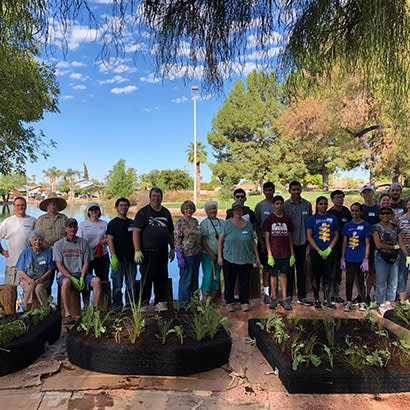
Nestled in the heart of Arizona’s Alameda Meadows is Selleh Park, a 6.3-acre area with a playground, picnic areas and all the amenities needed to make it a neighborhood destination. It is also home to a man-made pond that supports a variety of wildlife, including fish, birds, turtles and ducks. Over the years, that habitat has changed, and the city is using an integrated approach to positively affect the lake’s ecosystem, namely, by installing floating islands.
Floating islands occur naturally in water bodies across the world, and they act as a filter, providing a surface for microbes and good bacteria, which pull pollutants from the water. Mimicking them in park lakes and ponds also provides a habitat for plants and other wildlife, as well as shade and cooler water that will help the pond’s fish thrive.
“The floating island concept was initiated by a resident who, like the city, is committed to sustainable solutions,” says Tempe Parks Manager Craig Hayton. “She and other neighbors conducted all the research and made a very compelling case to the city council, which gave the project the green light as part of the city’s Innovation Fund program.”
In summer 2018, the Alameda Meadows Neighborhood Association received $7,000 from the Innovation Fund toward this project. In the fall, more than 30 neighborhood volunteers helped install the islands, which are made of recycled plastic. The soil has a coconut core, composed of shaved coconut shells mixed with water, and the plants on the islands include the Cardinal flower, yerba mansa, yellow monkey flowers, American speedwell, spike rush and blue rush, which are native to Arizona.
City staff will be analyzing the islands through June 2019 to gauge their effectiveness at cleaning the water and to understand the amount of maintenance required to keep the islands healthy. If this pilot project is successful, more floating islands could be installed at Selleh and other Tempe parks. This could mean significant long-term cost savings for maintenance and treatments, as well as providing wildlife habitat.
Learn more about the Selleh Park project.
Melissa Quillard, Public Information Officer, City of Tempe, Arizona

